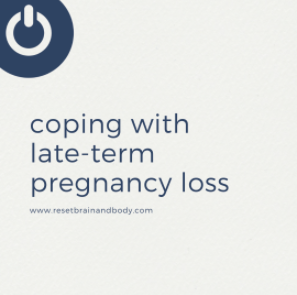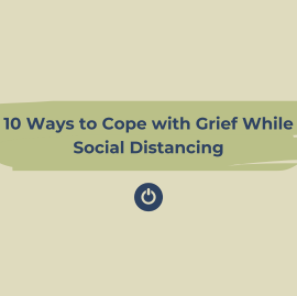The Story of Grief: On Death, Trauma and Tragedy
With the nation now surpassing 500,000 Covid-related deaths and a string of tragedies in my circle the past few months, this newsletter has been a long time coming.
Death is complicated and grief is so personal. I really hate it when people say, “I cannot imagine…” because it’s not that you cannot imagine, it’s just that you don’t want to. It’s painful to put yourself in someone else’s shoes when a tragedy strikes. But pain is part of life. We have to feel it to connect to each other.
So, let’s talk about how to help those grieving, truly.
TOOLS
There are wonderful resources out there for grief. Here are some of my favorites:
Grief Support Groups
This image shared on Twitter that in my mind perfectly explains the life-long journey with grief.
This documentary on Netflix that shows hope about what may come after we leave our bodies.
Some of my favorite articles written by Reset therapists:
GRATITUDE
In our discomfort with other people’s pain we, as humans, tend to avoid it. We say cliches and platitudes. We get awkward. We ignore the giant elephant in the room or someone’s life.
But the thing is, the loved one who died and the survivors of that death need space. They need space to process, cry, laugh, remember, hug, resist, rage and honor.
We must create that space.
One of my favorite ways to hold that space is to say, “tell me more about your loved one”. I like to hear stories, see the person light up in remembrance, share the gratitude for that person’s existence, and help them maintain that treasured space in their heart for their loved one.
“You will lose someone you can’t live without, and your heart will be badly broken, and the bad news is that you never completely get over the loss of your beloved. But this is also the good news. They live forever in your broken heart that doesn’t seal back up. And you come through. It’s like having a broken leg that never heals perfectly – that still hurts when the weather gets cold, but you learn to dance with the limp.” ― Anne Lamott
INNOVATION
Recently, it came out that there is a final “stage of grief” which has been called “making meaning”. I struggle with this one because again in our own discomfort, we try to find the silver lining or reason for the death. I think that’s the wrong way to look at “meaning” behind tragedy.
I think the meaning is made from learning of our own pain and resilience.
With any unfortunate, shocking, traumatic event, we grieve. We grieve the loss of innocence, privacy, joy, freedom, hope, the future, health, trust, etc.
It’s not that we can make sense of why something happened nor are we supposed to.
I feel what we must do is learn how to keep living in spite of the trauma. We must learn how to persevere, keep trusting, keep loving, keep hoping, and keep joy and gratitude and vulnerability alive.
The human existence is a lesson in transforming from pain.
If we resist the pain, we suffer in our own limitations of our courage to continue to navigate an inherently painful world.
“No matter what sort of difficulties, how painful experience is, if we lose our hope, that's our real disaster.”
―Dalai Lama XIV
FEELS
The real horrible thing of trauma is when it threatens connection to truth and vulnerability.
I ask you this week to reach out to someone struggling with anything - depression, anxiety, grief, trauma, disordered eating, loneliness, stress…
Ask them not, “how can I help?” or “what do you need?” or even “are you okay?”. They deserve more than those half-hearted attempts.
Go deeper. Get uncomfortable. Sit in their pain with them. Hold space for their feelings.
Tell them every day you are thinking of them. Hold their hand while they cry. Let them talk until they are blue in the face trying to reconcile their emotions. Get mad with them at the unfairness of life. Bring pictures, laugh over old stories, tell favorite memories and never, ever forget the human life that was taken away.
Offer permission to feel all the feelings, even the ones that make you feel uncomfortable. They and everyone everywhere will be better off for it.
If you or someone you know is struggling with suicidal thoughts, visit https://afsp.org/, text TALK to 741741 or call 800-273-8255.






